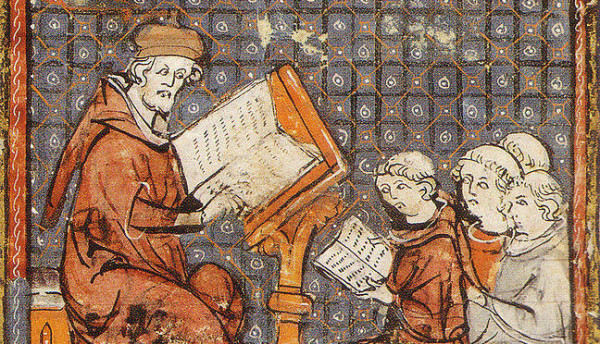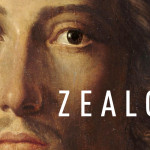Philosophy in the Eyes of Theologians: Friend or Foe? (Part 3 of 3)
by Tamer Nashef
Filed under History, Religion

NOTE: Today we conclude our three part series from Tamer Nashef on the relationship between philosophy and theology. Tamer's previous piece at Strange Notions, "I’m a Muslim But Here’s Why I Admire the Catholic Church", remains one of our all-time most popular posts.
The third and last segment of the essay will shed light on the brilliant theologians of the cathedral schools and 12th-century Renaissance. The theologians in question include Peter Abelard, Adelard of Bath, William of Conches, Hugh of Saint Victor, John of Salisbury, Peter Lombard, and many others. I will conclude the essay with a brief discussion on Thomas Aquinas whose philosophy constitutes the culmination of harmony between reason and revelation.
Peter Abelard (1079-1143) stands as one of the most eminent champions of reason and logic in the Middle Ages. He was a French philosopher, theologian, and logician who taught in the schools of northern France, particularly Paris and Laon, and “extended the rationalist program begun by Anselm” (Lindberg’s Beginnings of Western Science 208). He advocated the use of reason and doubt as a means of reaching the truth, stressing that “the first key to wisdom is assiduous and frequent questioning….For by doubting we come to inquiry, and by inquiry we arrive at the truth” (Durant 939). He is also reported to have told his students that “nothing can be believed unless it is first understood,” suggesting that understanding precedes faith (Hannam 43). In his view, “truth in search of itself has no enemies” and “truth cannot be opposed to truth” in the sense that the truths of revelation and the truths of reasoning are compatible because their source is one and the same, namely God (Huff’s Rise of Early Modern Science 141).
Abelard’s most famous work Sic et non (Yes and No or Pro and Con) assembled perceived contradictory or conflicting statements by Church Fathers on theological issues and sought to solve these contradictions through dialectical or Scholastic method. He also advocated the unfettered pursuit of knowledge irrespective of its source, as all forms of knowledge are beneficial, including knowledge of evil: "All knowledge is good, even knowledge of evil...the study of all knowledge is good" (141).
Like Saint Anselm who felt obliged to bring forward rational proof of God’s existence due to his fellow monks’ repeated requests, Abelard applied reason and logic to the articles of faith because his students “were asking for human and philosophical reasons and clamouring more for what could be understood than for what could be said” (Grant’s Science and Religion 156). He had little patience with blind faith that was not grounded in reason and understanding because in his view “the utterance of words was superfluous unless it were followed by understanding, and that it was ridiculous for anyone to preach to others what neither he nor those taught by him could accept into their understanding” (156). In his book on the Trinity, Abelard acknowledged that this article of faith surpassed the boundaries of reason, but the powers of reason could still be harnessed to counter arguments claiming the Trinity was false (Hannam 49).
Despite his commitment to reason and doubt, Abelard’s conviction in the truthfulness of Christianity never wavered as evident in the following moving words: “I do not wish to be a philosopher if it means conflicting with Paul nor to be an Aristotelian if it cuts me off from Christ" (Huff’s Rise 141).
For his part, Peter Lombard (1095-1160), who served as archbishop of Paris for a brief period and may have been Abelard’s student, played a key role in turning theology into a systematic discipline by organizing the opinions of Church Fathers in his famous Four Books of Sentences. This work, which had served as the primary textbook in the Western schools of theology until the 17th century and generated over a thousand commentaries in response, ranged over several theological themes such as God and His attributes, the creation, the Incarnation, the sacraments, etc. As evidence of the popularity of Lombard’s work, Grant points out that “[b]etween 1150 and 1500, only the Bible was read and discussed more than the Sentences” (Science and Religion 159). What is particularly notable about Lombard’s work is the combination of “reliance on authority with a willingness to employ reason in the explanation of theological points” (Woods 62).
Adelard of Bath (1080-1142) played a prominent role in the European translation movement between the 12th and 13th centuries, which guaranteed the transmission of Greco-Arabic learning into the West and brought the treasures of Islamic (and Classical) civilization within the purview of Latin scholars. During his travels in Palestine, Syria, Salerno, Sicily, and Cilicia, this English scholar learned Arabic and came into possession of Arabic manuscripts. He later translated Al-Khwarizmi's Astronomical Tables, Abu Ma'shar's Shorter Introduction to Astronomy, and Euclid's Elements (Lindberg’s “Science in the Middle Ages” 62). He pioneered the important distinction between empirical inquiry, concerned with how things work, and theology, concerned with why things are as they are (Howard 25). Therefore, it was the duty of the natural philosopher, rather than theologian, to investigate the causes at work in nature: “For the functioning and interconnection between all the senses are manifest in all living things…but which forces come into play in what connections with which method or mode, none except the mind of a philosopher can make clear” (Huff’s Rise 101). He is also said to have been among the first in Europe to have performed experiments, demonstrating that “water does not flow from a hole in the bottom of a closed vessel until a hole is made in the top to let air in. This contradicted Aristotle's theory of natural place" (Howard 25).
Adelard of Bath viewed reason as the hallmark of human nature, seeing that "[i]t is through reason that we are men" (Woods 87). It is this attribute, namely “the gift of reason,” that sets humans apart from beasts and compensates for their physical disadvantages: "Although man is not armed by nature nor is he the swiftest in flight, yet he has that which is better by far and worth more -- that is, reason. For by possession of this function he exceeds the beasts to such a degree that he subdues them...You see, therefore, how much the gift of reason surpasses mere physical equipment" (Huff’s Rise 102). He also denounced blind, unthinking subservience to authority: “For what should we call authority but a halter? Indeed, just as brute animals are led about by a halter whenever you please, and are not told where or why, but see the rope by which they are held and follow it alone, thus the authority of writers leads many of you, caught and bound by animal-like credulity, into danger” (Grant’s Science and Religion 161). He mocked readers and students who blindly trusted the conclusions of ancient scholars and “who require no rational explanation and put their trust only in the ancient name of a title” (161).
Adelard perceived order and harmony in the make-up of the universe, emphasizing its "amazing rational beauty” (Woods 87). While seeing God as the ultimate and primary cause of all things, he urged naturalistic and rational, rather than supernatural, explanations of natural phenomena, saying that "we must listen to the very limits of human knowledge and only when this utterly breaks down should we refer things to God” (87). Only after exhausting naturalistic accounts of nature’s operations, should the natural philosopher have recourse to miracles and divine intervention. Andrew of St. Victor endorsed a similar view, arguing that exegesis should consider all natural explanations of events in the Bible and only when such natural possibilities are ruled out, should the miraculous and supernatural be invoked: “…in expounding Scripture, when the event described admits of no naturalistic explanation, then and only then should we have recourse to miracles” (Huff’s “Science and Metaphysics” 189).
Hugh of Saint Victor (1096-1141), like Peter Abelard, called for the unlimited acquisition of all forms of knowledge, urging his students to "[l]earn everything” because “nothing is superfluous" (Watson 330). He also advised them to "[l]earn willingly what you do not know from everyone. The person who has sought to learn something from everyone will be wiser than them all. The person who receives something from everyone ends by becoming the richest of all" (Pope Benedict 220). He further stressed the necessity of studying logic, seeing it as a prerequisite to the study of philosophy: “…logic came last in time, but is first in order. It is logic which ought to be read first by those beginning the study philosophy, for it teaches the nature of words and concepts, without both of which no treatise of philosophy can be explained rationally” (Grant’s Science and Religion 150). Like his contemporaries, Hugh saw the universe as a “machine” and as an orderly and interconnected whole: "The ordered disposition of things from top to bottom in the network of this universe...is so arranged that, among all the things that exist, nothing is unconnected or separated by nature, or external" (Huff’s Rise 99-100).
John of Salisbury (1115-1180) argued that human reason could lead only to probable and incomplete knowledge and objected to its use for the elucidation of divine truths beyond the grasp of human comprehension. At the same time, however, he believed that human knowledge gradually increased through discussion and experience from one generation to another, but could never attain to perfection. Only God’s knowledge is perfect and is revealed through religion. Despite his qualms about the application of reason to revelation, John was not opposed to the use of reason per se, but saw it as a useful instrument. In fact, he hailed the “tremendous power” of logic and said those opposed to its use were “presumptuous” and “foolhardy” (Grant’s Science and Religion 150-1). Logic is necessary “to discriminate between what is true and is false, and to show, which reasoning really adheres to the path of valid argumentative proof, and which [merely] has the [external] appearance of truth” (151).
Like Adelard of Bath, William of Conches (1090–after 1154) made a distinction between the roles of theology and natural philosophy/science. The Bible and Church Fathers were the authority as far as moral and doctrinal issues were concerned but this was not the case when it came to natural philosophy: “In those matters that pertain to the Catholic faith or moral instruction, it is not allowed to contradict Bede or any other of the holy fathers. If, however, they err in those matters that pertain to physics, it is permitted to state the opposite view. For although greater than we, they were only human” (162-3). He also separated Biblical studies from science by charging that “it is not the task of the Bible to teach us the nature of things; this belongs to philosophy” (Huff’s Rise 101). William criticized priests who ruled out the study of fields of knowledge that were not addressed in the Bible and defended the legitimacy of studying natural philosophy, saying: “They don’t realize that the authors of truth are silent on matters of natural philosophy, not because these matters are against the faith, but because they have little to do with the strengthening of such faith, which is what those authors are concerned with. But modern priests do not want us to inquire into anything that isn’t in the Scriptures, only to believe simply, like peasants” (Grant’s Science and Religion 163).
William of Conches was one among many 12th-century theologians and natural philosophers who viewed the world as a rationally structured domain operating on the basis of consistent and fixed laws independent of God: "I take nothing away from God. He is the author of all things, evil excepted. But the nature with which He endowed his creatures accomplishes a whole scheme of operations, and these too turn to His glory since it is He who created this very nature" (Woods 87). His approach to the interpretation of the Biblical text favored discarding the literal meaning if it appeared to contradict reason or natural philosophy: "’He divided the waters which were under the firmament from the waters which were above the firmament.' Since such a statement as this is contrary to reason let us show how it cannot be thus" (Huff’s Rise 101).
Thomas Aquinas (1225-1274) is far and away the most influential Christian philosopher and theologian of the entire Middle Ages. He is particularly renowned for his grand project aimed at establishing rapprochement between faith and reason or synthesizing Christianity and Aristotelian philosophy. As part of this project, he presented a number of proofs of God’s existence (the Five Ways) by means of reason only and without appealing to Scripture. Like his predecessors such as Clement of Alexandria and Justin Martyr, Aquinas was more than willing to embrace the truths pagan philosophers had reached merely by reason, saying that "...sacred doctrine makes use also of the authority of philosophers in those questions in which they were able to know the truth by natural reason" (Albl 49). He particularly admired Aristotle whose ideas he believed were the best product of human reasoning unaided by revelation or divine inspiration, and he ultimately led to “ending the official Church's fears about the challenge which Aristotle's thought appeared to present to Christian faith" (MacCulloch 412).
Aquinas distinguished between truths of faith and truths of reason. The former, such as the Trinity and Resurrection, are not provable by reason and can only be believed or accepted on the authority of Scripture, while the latter, such as the existence of God, lie within the grasp of human reason and can be demonstrated through rational argument or reasoned analysis (Craig 32-3). Two points, however, should be made about the truths of faith.
First, though the truths of faith transcend the boundaries of human rational capacity, Aquinas argued that reason could still be utilized to respond to objections against articles of faith. In other words, the Christian theologian cannot prove the Trinity, but he should be able to answer by reason alone objections that this article of faith is illogical. In the words of one scholar, "[s]ince faith rests upon infallible truth, and since the contrary of a truth can never be demonstrated, it is clear that the arguments brought against faith cannot be demonstrations, but are difficulties that can be answered" (Albl 48). Therefore, “Aquinas thought that Christians should never hesitate to ask a reasonable question about their faith -- an answer could always be found" (48). Second, while the truths of faith are not rationally provable or empirically demonstrable, there are signs, such as the fulfilled prophesies of the Bible and reports of miracles, indicating that the Scriptures are divinely inspired and since the truths of faith are part of the holy text, they are to be accepted on its authority (Craig 32-3).
Christian, particularly Catholic, theology is stigmatized by many misconceptions that continue to permeate public discourse in the West. One does not have to be a Catholic or Christian to appreciate and even admire the work of theologians. Hopefully, this essay has succeeded in puncturing the myth that these theologians, especially in the Middle Ages, were anti-intellectual, superstitious, and hostile toward secular knowledge, philosophy, and reason.
Works Cited
Albl, C. Martin. Reason, Faith, and Tradition: Explorations in Catholic Theology. Winona, Minnesota: Saint Mary’s Press, 2009. Print.
Craig, Lane William. Reasonable Faith. 3rd edition. Wheaton, Illinois: Crossway. 2008. Print.
Durant, Will. The Age of Faith: A History of Medieval Civilization – Christian, Islamic, and Judaic – From Constantine to Dante: A.D. 325-1300. New York: Simon and Schuster, 1950. Print.
Grant, Edward. Science and Religion 400 BC- AD 1550: From Aristotle to Copernicus. Baltimore: The John Hopkins University Press, 2004. Print.
Howard, P. Ian. Perceiving in Depth, Volume 1: Basic Mechanisms. Oxford: Oxford University Press, 2012. Print.
Huff, Toby. The Rise of Early Modern Science: Islam, China and the West. 2nd edition. New York: Cambridge University Press, 2003. Print.
_________. 2000. “Science and Metaphysics in the Three Religions of the Book.” Intellectual Discourse 8, no. 2: 173-98. Print.
Lindberg, C. David. The Beginnings of Western Science: The European Scientific Tradition in Philosophical, Religious, and Institutional Context, Prehistory to A.D. 1450. 2nd edition. Chicago: The University of Chicago Press, 2007. Print.
________________. "The Transmission of Greek and Arabic Learning to the West.” Science in the Middle Ages. Ed. David C. Lindberg. Chicago: The University of Chicago Press, 1978. 52-90. Print.
MacCulloch, Diarmaid. A History of Christianity. London: Penguin Books, 2010. Print.
Pope Benedict XIV. Great Christian Thinkers: From The Early Church Through The Middle Ages. London: Society for Promoting Christian Knowledge, 2011. Print.
Watson, Peter. Ideas: A History of Thought and Invention, From Fire to Freud. New York: Harper Perennial, 2005. Print.
Woods E. Thomas. How the Catholic Church Built Western Civilization. Washington: Regnery History, 2012. Print.
Related Posts
Note: Our goal is to cultivate serious and respectful dialogue. While it's OK to disagree—even encouraged!—any snarky, offensive, or off-topic comments will be deleted. Before commenting please read the Commenting Rules and Tips. If you're having trouble commenting, read the Commenting Instructions.












